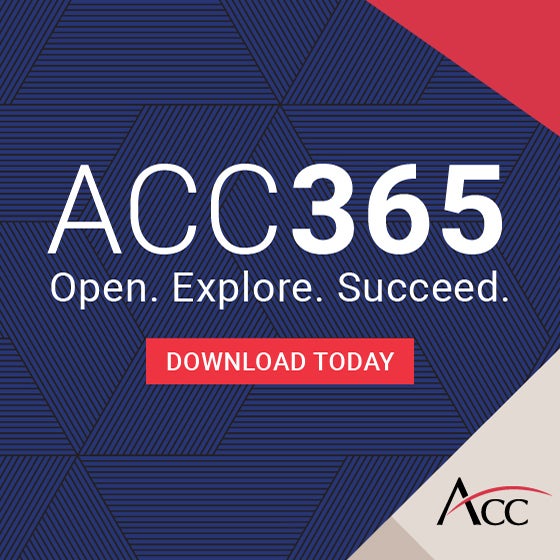In our June issue of the newsletter, we heard from Jessie Porteus, Founder at The Learned Crew & Legal Counsel at Coca-Cola Amatil in our 'Member in the Spotlight' piece. Each month we will be putting an ACC Australia member in the spotlight and asking them to share their experiences as an in-house lawyer.
Tell us about your current role. I work as a Legal Counsel at Coca-Cola Amatil, which is one of the largest bottlers and distributors of non-alcoholic and alcoholic beverages in the Asia-Pacific region. I am so lucky to work with an award-winning team that are so dedicated to our internal clients – they inspire me every day. Our legal team works on almost everything with a legal flavour which keeps us very busy, however in my recent move to part time, I now focus mainly on sponsorship contracts, marketing, consumer law and intellectual property, which is so much fun! No two days are the same in-house and the variety is fabulous.
I am also the founder of a legal training business called The Learned Crew, which aims to prepare the next generation of lawyers for the real world of law, including in-house legal practice. I am very lucky to have such a supportive team at Amatil that allows me to pursue my passions. I have hit the jackpot being able to work as an in-house lawyer and on my start-up. I could not be happier.
What do you believe is the most important skill an in-house lawyer needs? There are so many skills that an in-house lawyer needs. In-house lawyers must be commercial, adaptable, strategic, highly-trusted, influential, pragmatic, empathetic, active listeners, efficient and effective communicators, relationship-builders, solutions-focused, creative, not afraid to speak up about issues, and have unwavering integrity.
I recently asked my wonderful network on LinkedIn about what it means to ‘be commercial’ and it was so interesting to see the diversity of thought amongst my colleagues around what it means. For my first few years in-house I just could not reconcile being a lawyer and being a commercial business person at the same time, as I thought the risk profiles of each seemed to be opposite. It was really interesting that others had found this difficult too. It was so interesting, I had to write a blog post about it! The conclusion seemed to be that for in-house lawyers to really be commercial means to have that business mindset to be able to guide decisions of the organisation that advance the organisation’s goals and objectives, while at the same time limiting exposure to legal, reputational and financial harm. While there was no set definition or consensus, it was clear that being commercial is absolutely necessary to succeed in-house. You have to be more than just a lawyer! This does take time to learn and master though.
What led you to pursue an in-house legal role? I always loved intellectual property law (in fact I was working in an IP team at a top tier law firm when the job at Amatil came up), and so the prospect of working for a company who owned some of the most famous trade marks in the world was very enticing. I was also seeking variety, and I wanted to see the business side of things. Being a life-long learner, it was one of the best things I have ever done in my career as the learning curve has been exponential. This role has allowed me to work towards being what I like to call a “GP of the legal world”, and it has also given me invaluable insights into the business world. I am so grateful for the opportunity to learn from some of the best lawyers and business people in the country.
What advice would you offer to in-house counsel in building relationships with their organisations? Get to know your clients really well. Ask them about their day-to-day work (shadow them if you can for a day), their priorities and goals, their careers, and if appropriate, ask them about their lives, hobbies, dreams etc – and then share the same with them. It is all about teaching, learning, and most importantly, empathy from both sides. In hindsight I wish I had done this from the start, but now that I actively do this, I have found that there is even more mutual trust and respect between my clients and me, and I believe leads to better and more open dialogue. Breaking down those barriers and lawyer stereotypes is really important too.
What is the one thing a law degree doesn’t teach you about being an in-house lawyer? There are actually a lot of things that a law degree doesn’t teach you about the real world of law (I started The Learned Crew to try to bridge this very gap), but perhaps the top for in-house are being commercial and adaptable, and to be specific, how to prioritise urgent work. In partnering with ACC Australia for an exciting pilot in-house clerkship program this year, we are running training for law students on the basics of in-house law, including how to prioritise an urgent inbox full of legal and other tasks. We are really looking forward to giving law students opportunities to learn about in-house, and to gain real-world experience with some amazing in-house legal teams.
As an aside, I am so glad to see that law schools, advocacy groups and the media are finally turning their attention to the need for reform to legal education. I recently completed a Harvard University course in Teaching and Learning, and through this study I found out that this was not just a problem in Australia – it is a worldwide problem. While technical knowledge and analysis is essential to legal practice given the intellectual rigour and attention to detail required, lawyers must also have practical, professional and soft skills to truly succeed (particularly in light of technology disruption and AI). The current and often Socratic and rules-based teaching and learning methods are said to ‘fail to prepare students for the practice of law’,[1] despite numerous calls for reform to the legal education system.[2] Skills training is often left to the legal profession, which is expensive and inefficient for lawyers and for clients.
What are the biggest changes you’ve witnessed across the legal sector since you joined the profession? Where do I start? What a fascinating time to be part of the legal profession, as it finally starts to keep pace with the rate of change in our world. Besides the obvious technology disruption, I have seen the rise of in-house counsel as one of the fastest growing segments of the legal profession, and with that, the increasing pressures and expectations on in-house lawyers to be more than just lawyers. We have more scope to use our skills in interesting and creative ways which is both challenging and exciting at the same time!
Finish this sentence…. If I wasn’t a lawyer I’d be…. a dancer or a teacher… or dance teacher.
I like being a part of the ACC Australia community because ……. I love the collegiality of the in-house community. I have been blown away by the generosity and kindness of in-house lawyers and the ACC, with helping each other within this wonderful segment of the legal profession. After all, we are all in this together so why not share our learnings! In-house counsel generally go through the same things – the same highs, and the same lows and challenges. We should be, and from my experience we are already, through the fantastic work of the ACC and its members, sharing our thoughts and ideas across the profession – which I think is a beautiful thing. Go to the seminars, connect with in-house counsel on LinkedIn, get involved in the ACC mentoring program, or simply invite another legal team over for drinks or do some community work together! Our team has done that quite a few times and it is just so lovely to meet other in-house teams, swap stories, and support each other.
Also, the annual ACC conference is so much fun! Bring on the next dance off (for those that went to the Canberra conference a few years ago, you’ll know what I’m talking about)…
[1] Cristina D. Lockwood, ‘Improving Learning in the Law School Classroom’ (2013) 95 Clinical Law Review Vol. 20:95.
[2] William M. Sullivan, Anne Colby, Judith Welch Wenger, Lloyd Bond, & Lee S. Shulman, Carnegie Foundation For The Advancement Of Teaching, ‘Summary Of The Findings And Recommendations From Educating Lawyers: Preparation For The Profession Of Law’ 28 (2007).


